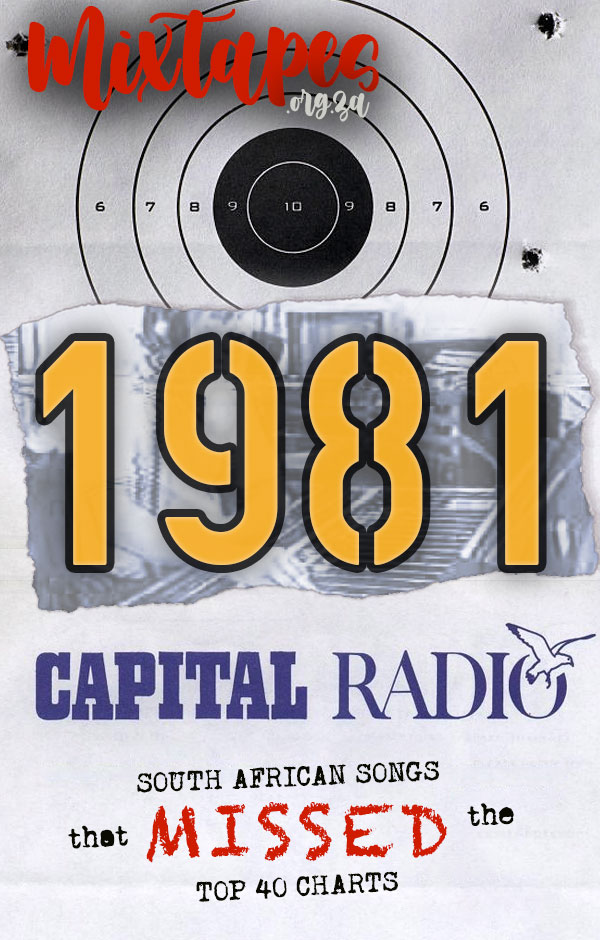
There was plenty of good South African music in 1981. 14 South African songs made the Capital Top 40 countdown and we think there are 21 more songs which should have made the cut. There was also a healthy variety of musical styles, from post-punk, ska, reggae and new wave to folk, pop, rock, funk and soul, very often with a particular South African flavour such as Juluka’s Zulu folk-rock, David Kramer’s Western Cape klopse folk and the township funk-soul sounds of Harari, Kabasa and the Movers.
1981 saw a continuation of the resurgence of original South African music with the alternative scene rooted in punk, ska and new wave continuing to grow. The Asylum Kids, National Wake, Flash Harry, the Lancaster Band and the Usuals had each been gaining a following on the live music scene and now emerged from the studio with songs worthy of radio play. Mara Louw, who had appeared in musicals for years, made her debut solo recording, as did David Kramer, who brought out the album Bakgat after gaining a strong following on the folk circuit, particularly in the Western Cape. The Radio Rats re-appeared with “Erase” after the success of their 1978 hit “ZX Dan” (see Youtube for the video as it appeared on SABC at the time), Falling Mirror followed up 1980’s “Neutron Bop” with “The Crippled Messiah” and Bite released “Loud Radio” after previous singles had not received much attention. There were also songs from a variety of established performers from Harari, Steve Kekana and John Kongos to the Julian Laxton Band, Marumo, the Movers and Neville Nash. And there were interesting new experiments from the Pop Guns (a minor super group comprising members of the Radio Rats, the Chauffeurs and the Safari Suits) and Soweto Soul Orchestra (a studio project put together by Sipho Mabuse).
Several of these songs were playlisted on Capital Radio but did not make the Top 40 countdown: “Schoolboy” – Asylum Kids, “Loud Radio” – Bite, “Modern Science” – Lancaster Band, “Make A Stand For Love” – Julian Laxton Band, “Crippled Messiah” – Falling Mirror, “Shine On (Brightly)” – Steve Kekana, “I’m Dreaming” – John Kongos and “Rules And Regulations” – The Usuals. Furthermore, some of these musicians were playlisted with songs not featured here: Flash Harry (“Hot blood”), National Wake (“Supaman” and “Bolena”), Harari (“Liven up”) and Neville Nash (“Wind Me Up”).
Meanwhile over at SABC’s Radio 5 some of these songs were prohibited from airplay. The entire Bakgat album by David Kramer was not allowed to be played for various reasons including the way he mixed languages (which went against the SABC’s apartheid policy of cultural purity), his use of inappropriate language (slang and obscenities) and his mild criticism of the apartheid establishment. Flash Harry’s satirical protest song, “No Football”, was banned from airplay because it was viewed as blasphemous, indicating that more people watch football “than go to church”. “Crippled Messiah” by Falling Mirror was also rejected because the SABC censors thought it was blasphemous. The Asylum Kids’ “Schoolboy” was also not played on SABC, because it was seen to encourage a rebellious attitude towards school. The SABC were not yet playing Juluka because they mixed languages in their songs and they sometimes took on political themes critical of the government, for example in “African Sky Blue” they note that “Soon a new day will be born” and that “The warrior’s now a worker and his war is underground”. In 1981 Radio 5 was not playing reggae and so the Usuals and National Wake were not considered acceptable. This was especially true of National Wake given their political edge, with lyrics like “Wake up nation, wake up, ‘cause this might be your very last chance, we’re bubbling up in the new time space with the new time people” (“Wake Of The Nation”).
Fortunately some of these songs were heard on South African airwaves thanks to Capital Radio, but most of all we have the musicians and record companies to thank, for writing and recording these songs, regardless of how the broadcasters would react.
Show Playlist + Poll–

